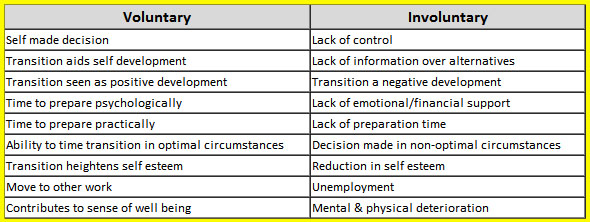Career Transition
‘Fateful moments are transition points which have major implications not just for the circumstances of an individual’s future conduct , but for self-identity’ (Giddens 1991/2004: 148)
In other words any life changing event can be seen as a transition period which has implications for the way we perceive ourselves and the way we behave. There are two basic forms of transition, Voluntary and Involuntary. The table below highlights some of the main characteristics.
The primary difference between voluntary and involuntary change is the amount personal autonomy in opting for change which then influences the perception of the transition either in a positive or negative fashion. The need to prepare well in advance for the psychological effects of the transition is of primary importance. A key question to ask in preparation for any musical career transition is ‘Who am I if I’m not a musician?’ It may even be necessary to redefine, in general terms, what it means to be a musician.
Research generally supports the view that it is individual perception of change that determines the outcome of change. Thus, job loss can be seen as a ‘blessing in disguise’ if individuals are able to develop aspects of themselves that were previously not possible due to the constraints of the job.
The professions of sport and dance are well equipped to deal with career transition presumably because of the inevitability of early retirement. In contrast, the job of a musician is generally thought of as a job for life. However, diminishing opportunities for work, physical and psychological stress and low financial rewards mean that more musicians are forced to consider career change, either voluntarily or involuntarily. There is a real need for support mechanisms to be put in place to help musicians who find themselves in a situation of career transition.
Other useful information
As there are few resources to help musicians contemplating career transition I would advise exploring the literature on sport and dance.
www.thedcd.org.uk is a specialist organisation to help dancers with transition where you can also read about individual case studies
On www.bapam.org you can find a register of counsellors who offer help specifically for musicians.
Oakland (2010) When the Music stops. Classical Music Magazine
David Lavallee & Paul Wylleman. Career Transitions in Sport. International Perspectives.


Leave a Reply